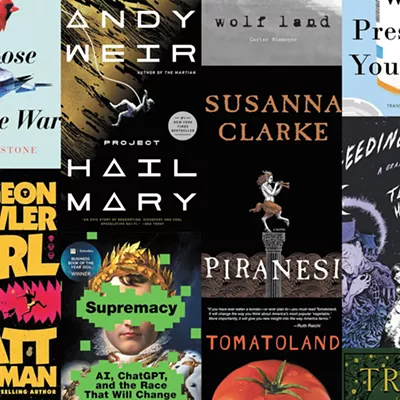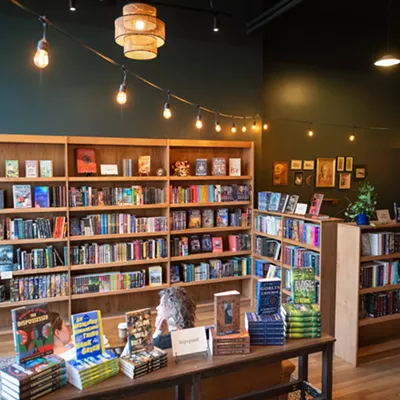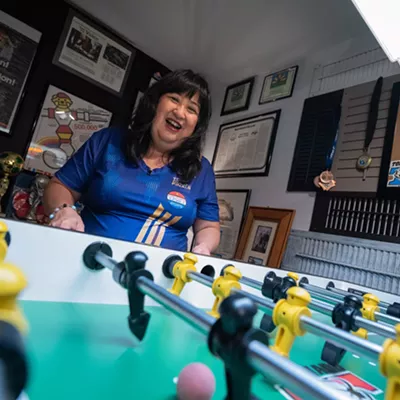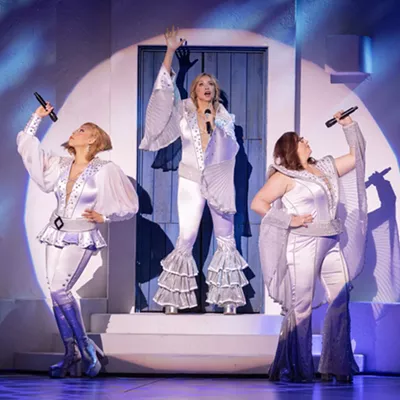sandstone cliffs swollen river the color of rushing pennies a rusted Suburban hidden in tamarisks a leashed three-legged dalmatian pulls a man and his cigarette upriver at nightfall they cut the dog’s throat the man wipes his eyes he makes the boy do it the boy peels away flesh like opening a book the boy roasts dog meat on a spit of slender hard tamarisk above flickering coals stars a pale wedge of moon the color of dalmatian skin, the man thinks, going into a clump of saltbrush to piss the boy lies on the worn back seat of the suburban and thinks about the man’s increasing weakness a waning moon, the boy thinks the boy covers his eyes with his forearm his last pill in his bloodstream like silt in a muddy river his veins and arteries like canyons, he thinks like highways the boy hears the man retch, the boy hears dry heaves before hearing the man vomit up dalmatian meat the boy hears wind rushing through the brittle tamarisks and streamside cottonwoods the boy hears the river
But earlier that morning the sunshine already hot on the black highway of the mesa the man squints into the painful eastern sky as he drives carefully the speed limit (the man wakes the boy with a probing booted toe where the boy sleeps by a rough knob of black greasewood, “Gotta go, Dyl,” the man says, in his singsong voice, the man already jittery, Dylan notices, with some concern—it’s a simple thing they have to do, after all, a simple thing they descend into sandstone canyons the color of copper wire in the morning sun the clear sky weighted with low clouds that will become the afternoon’s thunderstorms they enter the town a little before noon the town like all these tilted highway towns—the small houses the spare lawns wrestled from utah dirt with lawnsprinklers and trowels the corn fighting to survive the blood-colored soil the white spire of the tabernacle the river muddy beneath the cliffsides and the broken mesas (“Mike,” the boy says, “It’s too early,” he replies, waking up in the bright safflower-colored sunlight, shading out the sun with one hand, flicking open his black film cannister—only scattered pills left—with the other, but the man already has the doors open, he’s already checking out his snaggly teeth in the side mirror, and he’s already climbing up into the suburban, turning the key in the ignition and making as if to run the boy over if the boy don’t get up, and the boy scrambles out of his bag and begins to roll it up, understanding that mike had taken some of his pills in the pre-dawn morning, but in his suddenly awakened state the boy isn’t sure what to do or what to say and so he makes sure to say nothing, not yet, as he throws his bedroll and then himself into the chevy) and just beyond the town they turn from the highway onto an unsigned dirt road and bump down over rocks to the river running alongside Milt Barlowe’s place, an RV with rusted axles mounted on cinder blocks the weight of tires holding the roof down the other trailers like mud-spattered boulders a three-legged dalmatian lying beneath a chokecherry watches them arrive without barking two diapered boys—or girls—with plastic shovels stare at them like they’ve never seen white skin before Barlowe comes out of the trailer shading his eyes against the sun “Michael?” he asks (and as they drive Dylan looks at Mike and he whistles, “Got your Sunday best on, huh?” he says, his hands shaking about the stolen purple hearts but he’s not quite sure how to bring it up, not yet, not after everything they’ve been through together — the bars they’ve hit up, and the trailer parks, and the way the man had rescued him from east-coast thickets of seven-elevens and nudie bars, from the urine taste of musky crotches, from rooms illuminated with single bulbs the boy not sure how to bring it up, not after the way mike had found him and rescued him from cold wharves and pointless robberies, like he’d been trapped in a cold metal river and swimming hard so as not to get swept away like so much trash the boy not sure how to bring it up since they’re both a little drugged and low on sleep and it’s a sunny Utah morning and they’re armed with their long knives and mike is dressed as well as he can be — and so the boy decides to wait, the boy elects to say nothing the boy stares out the passenger window and they drop into deeper canyons, red on all sides, and he stares at the broom-yellow bursts of snakeweed along the highway and thinks about Megann and her tight white culottes, and the way he’d thrown a tennis ball in the street with her son in the late evening) “Michael!” Barlowe exclaims, coming out of the RV onto the concrete of the patio the RV lifts on its springs, as if in relief “It’s okay, Barlowe,” Mike says “We’re not here about the money” “We’re not here about that,” and the boy notices that Mike is trembling and he knows that it’s not just because of the pills (the boy realizes, as they drive, that this isn’t about the money, nor is it about pride, the boy realizes that this isn’t about anything other than the woman, Vita, and her crooked smile, and the way she’d danced at the moonlit bar that night, her ass shaking in the outdoor bar like great sandstone monoliths crumbling into one another, the boy realizing as they drive that this isn’t about anything other than Mike starting to feel the passing of years, like being carried down a muddy swollen flooding river too, and that this isn’t about anything other than mike wanting to grab onto something solid, and hold on, and pull himself out) “She’s not here,” Barlowe says, not smiling, glancing at the two kids in the sandbox she went to Mexican Hat, he says, or actually, come to think of it, was it Farmington? and the boy glares around at the surrounding trailers and he thinks, Vita could be in any one of them, and he wishes, in that moment, that he’d gone into the army after all—he’d had the paperwork mostly filled out — because then he would know how to search for an enemy combatant, and would therefore know how to search for a woman in a trailer, and Barlowe says, “You can come in,” then says, “You boys be good, you hear?” and the boy isn’t sure if he’s talking to him and mike or if he’s talking to the kids playing in the sandbox and as they enter the egg-smelling trailer, Barlowe turns and looks at the boy and says, you got anything? and mike looks at the boy, too, dolefully, the way the dalmatian had gazed at them from underneath the chokecherry tree, and the boy pulls out one of his remaining pills and hands it over to Barlowe, and he gives mike one, too, cause if they’re not gonna find vita they’re for goddamned sure gonna get the money, the boy promises himself — he didn’t come all this way for fucking nothing
But earlier than any of that, before they’d even met Milt Barlowe and Vita at the Rimrock Bar on that moonlit night when everything had seemed glittering, the highway and the stars and the moon and the wide-open sky, and it had all seemed like anything was possible, like he could just start all over out here — even before that night when the band had been terrible but the beer had been foamy and good, and even before the day when they’d worked their first of the many towns along the highway — before any of that, they’d stopped one afternoon on the edge of a sandstone escarpment, having just come across the state line into Utah the gravel road switchbacked straight down beneath them, leading to a valley bigger and wider than anything the boy had seen in his life “You could fit all ‘a jersey down there!” he’d exclaimed, and Mike had smiled, and they sat on what seemed the edge of the earth—ravens and scrubjays far beneath them and a storm built itself up: great thunderheads the size of mountains white sheets of rain drifting in slow-motion across the valley lightning slow thunder crumbling the copper-tasting air and the boy stared with his mouth open for hours until the storm passed and the clouds unbuilt themselves the sky gleaming clear again as if freshly washed and the boy thought that in a place like this anything might happen, and he might even find something to hold onto like he might be able to climb out of the river and stand solid on whatever riverbank would hold him
About Jordan Hartt
Jordan Hartt is the director of programs for the Port Townsend Writers' Conference and the founding editor of Conversations Across Borders, the philanthropic literary journal that raises money to support schools and emerging voices around the world. His work has appeared in many journals, magazines, and newspapers.
About the Contest
The 56 entries we received this year represent a record for our fiction contest. Either the theme — debt — weighed heavily on people’s minds or the unemployment rate just left a lot of aspiring writers with nothing to do but write. Either way, the submissions this year were strong, in addition to being numerous. These stories — about the things that break people, the things that heal them, and some very obedient fleas, among other things — are our favorites.
— Luke Baumgarten, Section Editor


















